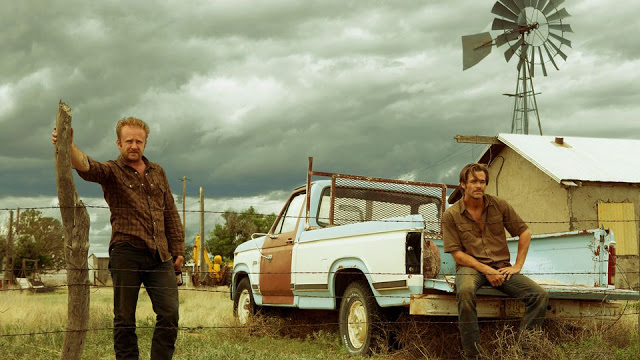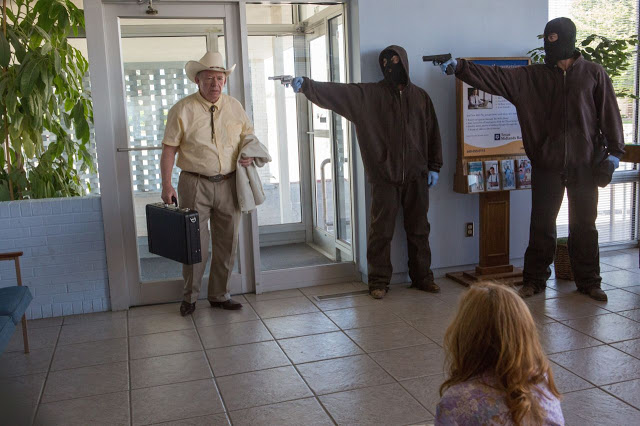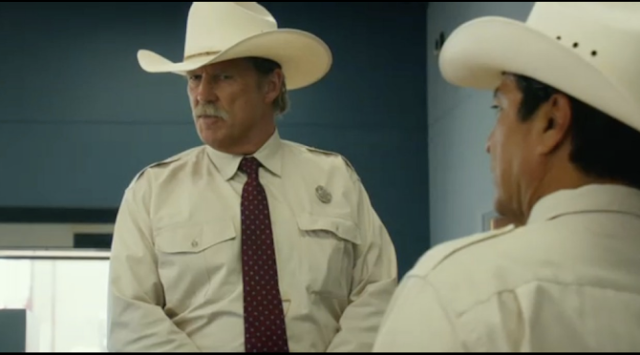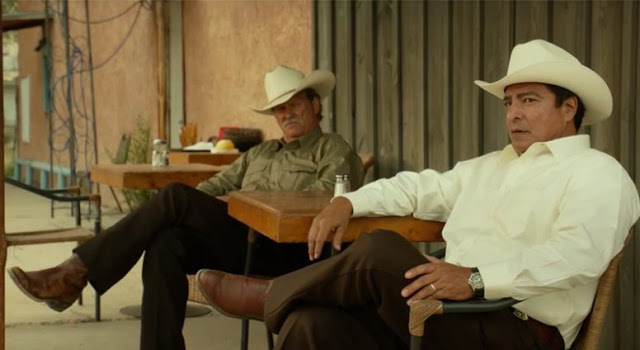The dusty Texas landscape of Hell or High Water is dotted with brightly colored billboards, each promising salvation to those in need. The path of this purported deliverance is not spiritual but financial; neatly lettered signs like “Fast Cash” and “Debt Relief” court blue-collar laborers who are behind on their mortgages or their bills. The striking visual contrast—between the glossy print of the highway advertisements and the dilapidated cars and trucks that drive past them—hints that these assurances are illusory, a cruel commercial ploy to exploit the perpetual suffering of the working class. It’s an accurate impression, as the movie is, in part, a damning indictment of corporate avarice, one that recalls the impotent rage of The Big Short, only with the gleaming skyscrapers of the Big Apple replaced with the vast and desolate ranches of the heartland. Hell or High Water is in many ways a classic heist picture, but the true thieves depicted here are the banks.
That may sound a tad polemical, and it’s fair to criticize Hell or High Water for tarring and feathering an avatar of exaggerated evil that has already been burned in cinematic effigy. (Recent examples include 99 Homes and Money Monster, though the closest comparator here is Killing Them Softly, Andrew Dominik’s seamy underworld yarn that embellished its pulpy narrative with persistent commentary on the government’s post-Katrina nonfeasance.) But this smart, soulful movie is too nuanced—and too compassionate—to be reduced to its talking points. Its message may be broad, but its details are thrillingly specific.
This begins with its geography. With its omnipresent Stetsons, its solitary roadways, its rueful shots of windswept acreage, and its proud Second Amendment-endorsing citizens, Hell or High Water may be the most Texan movie ever made. (Its lone demerit on this score is that filming actually took place in New Mexico.) Yet while it often seems to take place in a lost-in-time frontier—the kind where a crotchety waitress will upbraid customers who order anything other than a T-bone steak—its characters still live under the poisonous cloud of the modern banking oligarchy. That’s certainly true of Toby (Chris Pine, curiously cast), a divorced father of two whose reverse-mortgage is in default and who is about to lose his family homestead despite recently striking oil on it. Determined to provide for his children—and disgusted by the rapacity of his lender, Texas Midlands Bank—Toby hatches a desperate and vengeful scheme: He will rob a series of Texas Midlands branches, launder the money through a casino, then use the ill-gotten gains to pay off his mortgage before the bank forecloses at the end of the week. For help, he enlists his brother, Tanner (Ben Foster, typically excellent), an ex-con with a wide grin and a short fuse.
Director David Mackenzie establishes the film’s distinctive tone right from its electric opening scene, in which his camera first centers on a bank employee in a parking lot (Dale Dickey, from Winter’s Bone), then wanders toward Toby and Tanner’s car, and then finally follows the employee into the bank, which the brothers proceed to hold up. It’s a robbery that’s brisk, tense, sharply violent, and oddly colorful. Some of that lies in the genre execution, which Mackenzie imbues with sufficient verisimilitude (Toby and Tanner insist on only stealing loose bills from the drawers to avoid acquiring traceable funds, but they’re unable to access the safe because the teller lacks the key). But he also swiftly defines these siblings who, even though they wear masks, possess divergent personalities; Tanner’s angry shouts mark him as terse and volatile, whereas Toby’s wide eyes and anxious body language imply that he’s almost apologetic about his criminality.
Watching the brothers during this quick-and-dirty heist and their ensuing getaway, you might think that they fall into familiar movie archetypes—the hotheaded lion and the helpless lamb. But none of the characters in Hell or High Water is so easily pigeonholed. Tanner may be prone to bursts of rage, but he also exhibits a roguish charisma, and Foster makes him indecently likable while still making plain that he’s a psychopath. Pine has the trickier part, and his irrepressible good looks initially make it difficult to accept Toby as a hardscrabble everyman. But the script slyly capitalizes on the actor’s handsomeness—virtually everyone who meets Toby is attracted to him, which gives him a strategic advantage over your typical tough. Besides, while he may lack his sibling’s live-wire ferocity, Toby is more callous and calculating than he first appears; when he isn’t devising ways to keep the police off their tail (such as burying their cars under gigantic mounds of dirt), he’s pummeling hoodlums outside a gas station with an enthusiasm that suggests that violence runs in the family.
It runs in the state, too, which accounts for the Texas Rangers, the other side of Hell or High Water‘s cops-and-robbers divide. The particular ranger pursuing Toby and Tanner is Marcus, a salt-of-the-earth lawman on the cusp of retirement. Marcus is virtually the Platonic ideal of a cinematic detective: gruffly competent and perceptive, but also leisurely, funny, and charming. In other words, he’s Jeff Bridges.
If Hell or High Water were a bigger-budget production, it would be tempting to dub Bridges’ performance in it as the apotheosis of his entire career, which has spanned a rough half-century. Then again, that sort of bold claim is antithetical to the laidback style that Bridges has cultivated ever since his role in The Big Lebowski made him an abiding cult icon. Still, I can state with some confidence that this is Bridges’ best work in quite some time, and superior to his Oscar-winning turn in Crazy Heart. As Marcus, he’s as casually captivating as ever, with a winningly cantankerous disposition that allows him to constantly belittle his mixed-race colleague, Alberto (Gil Birmingham), without ever once seeming mean. But Marcus’ faux-irritable demeanor camouflages a more complex individual, and in the film’s latter scenes, Bridges beautifully articulates this rascally coot’s hidden vulnerability and bone-deep dignity. It’s as if the part were written specifically for him.
Speaking of writing, the script for Hell or High Water is by Taylor Sheridan, the promising actor-turned-screenwriter (perhaps coincidentally, his first role came as a guest star on Chuck Norris’ Walker, Texas Ranger) who last penned the unforgettable Sicario. That merciless movie sketched humanity as an inky black void, and it portrayed the Southwest as an arid wilderness where any flickers of hope and decency were quickly extinguished. Hell or High Water has its share of brutality, but it paints a much warmer picture. It features only a handful of set pieces, all of which are skillfully staged but which also feel somewhat incidental. What it really is—as telegraphed by the delicate scraps of Nice Cave and Warren Ellis’ gentle score—is a poignant character study.
In particular, Hell or High Water is a rumination on the bonds of fraternal love. In his prior film, the vicious Irish prison drama Starred Up, Mackenzie explored the strained-but-enduring relationship between a father and son in the context of a harsh, unforgiving society. Here, he turns to brothers, both literal and metaphorical. Toby and Tanner are clearly very different people, but they nevertheless share blood, and Pine and Foster together create an invisible connection that feels unshakable. And while Marcus and Alberto roll their eyes at one another more often than not, they have also formed a loyal partnership rooted in mutual respect and grudging admiration. As Hell or High Water progresses toward the inevitable collision of these two brotherhoods, it accumulates an emotional power that is both tragic and strangely uplifting.
Talking of Texas in the Coen Brothers’ Blood Simple, M. Emmet Walsh memorably intoned, “Down here, you’re on your own.” Hell or High Water pays tribute to that peerless noir (as every gritty American crime drama must), but it also quietly and movingly subverts its nihilism, replacing it with tenderness and grace. It may rail against the injustices of the economy, but its characters aren’t the only ones in arrears. When artists deliver a movie as gripping and heartfelt as this one, it is we, the viewers, who are in their debt.
Jeremy Beck is the editor-in-chief of MovieManifesto. He watches more movies and television than he probably should.





A couple of thoughts on the script:
1) After our hero Toby is shot twice and is separated from his brother he does remarkably well to sit in a bar drinking beer;
2) Dirty racist epithets like ‘inju**’ are not welcome here, or anywhere; they only serve to offer yet another generation of angry people to repeat these words and to reinforce them with violence;
3) An American Indian is not likely to know anything about truffles or the geography of ‘blind truffle pigs’.